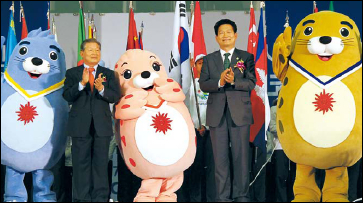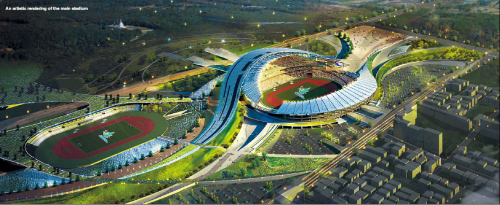While all eyes will be on China’s southern city of Guangzhou for the 2010 Asian Games scheduled for Nov. 12-27, South Korea’s Incheon is also preparing for the 2014 Games.
Last week, the Incheon Asian Games Organizing Committee unveiled its official mascot and emblem. The mascot that reflects harbor seals which inhabit Incheon’s Baegnyeong-do, and the emblem which projects the image of people holding hands, will be on display during the Guangzhou Asian Games, promoting the Incheon Asian Games, according to the organizer.
Last week, the Incheon Asian Games Organizing Committee unveiled its official mascot and emblem. The mascot that reflects harbor seals which inhabit Incheon’s Baegnyeong-do, and the emblem which projects the image of people holding hands, will be on display during the Guangzhou Asian Games, promoting the Incheon Asian Games, according to the organizer.

Earlier, the IAGOC had sent its officials to Guangzhou, aiming to gain first-hand knowledge and experience in the Games preparation.
“From September, 13 members of our staff have been working in Guangzhou, involved in a variety of jobs for the committee. They will be working there until the end of the Games, becoming a part of the Games,” said Park Dal-hwa, PR manager of the IAGOC. “We believe their experience will certainly help us to prepare for a successful Asian Games in 2014.”
China claims that Guangzhou Asian Games will be the biggest Asiad ever with a television audience of billions. The Guangzhou will feature 42 sports, including 28 Olympic sports and 14-non-Olympic sports, breaking down into 476 disciplines. And more than 14,000 athletes and officials from 45 countries are taking part in Asia’s biggest sporting event, competing for a record 476 gold medals.
To ensure a successful event, Guangzhou, the hub of China’s export-oriented power, has poured 6.3 billion yuan ($943 million) into the construction and maintenance of stadiums, and allocated 7.3 billion yuan as operating funds for the games. “The Incheon Asian Games will be a smaller event with less sport,” said Park.
In order to meet the requirement of the Olympic Council of Asia, the number of events will be down to 35 for the Incheon Asian Games, according to the committee.
“The Incheon Asian Games will be a bit smaller, but it will be very different from any previous events,” said Park.
The organizing committee claims that the Incheon Asian Games will change the history of Asiad by giving more countries chances to win medals.
Since the Asiad began in 1951, only a handful of countries, including Korea, China and Japan, have won the majority of medals while many others have never won a medal.
While bidding for the 2014 Games, Incheon pledged $20 million in support of the countries that have yet to reach the podium at the quadrennial event.
In 2007, Incheon established the OCA-Incheon Vision 2014 program that is designed to narrow the gap by providing training facilities, courses and even coaches to athletes from countries in need of professional support.
The seven-year program also invites young promising athletes from across Asia, and offers them opportunities to train in Korea.
So far more than 350 athletes from 20 different counties have visited Korea thanks to the program, according to the committee.
“Some of them are now competing at the Guangzhou Asian Games. And there is a chance that they can win a medal,” said Lee Neung-hwan of the Incheon committee.
The OCA-Incheon Vision 2014 program will not only boost the image of Incheon but also help to make the Asian Games more prosperous, according to Lee Yun-taek, the president of the IAGOC.
“We’re working hard to take the Games to the next level, to become a new model and symbol of a new Asian era,” Lee said earlier.
The 17th Incheon Asian Games will run for 16 days from Sept. 19-Oct. 4 in 2014. With the dates set, construction for competition venues is well underway.
A total of 40 venues, 56 training sites and two athletes and media villages will be used for Incheon Asian Games. Among the 40 venues, 20 sites already in place and rest of them, including the main stadium with a capacity of 70,000 seats, will be completed by June 2014, according to the committee.
The IAGOC claims that the main stadium, which will be built in the heart of the Incheon Free Economic Zone, a $40 billion development project about 65 kilometers west of Seoul, will create a new green network in Incheon. It will be designed to use alternative and renewable energy, the committee said.

Incheon will be receiving the Asian Games flag at the closing ceremony of the 2010 Guangzhou Asian Games on Nov. 27. It will be Korea’s third Asiad. The country held the first Games in Seoul in 1986 and the second in 2002 in Busan.
The IAGOC claims that the Incheon Games will be a new milestone in the advancement of both the city and the nation. “Incheon Asian Games Organizing Committee, Incheon City, and Incheon citizens will work together to help develop Incheon into one of world’s top cities,” Lee said.
“Also, we will make sure this event an opportunity to open the doors to the ‘Asia era’ and strengthen the friendship and cooperation of the Asian community.”
By Oh Kyu-wook (596story@heraldcorp.com)









![[Kim Seong-kon] Democracy and the future of South Korea](http://res.heraldm.com/phpwas/restmb_idxmake.php?idx=644&simg=/content/image/2024/04/16/20240416050802_0.jpg&u=)







![[KH Explains] Hyundai's full hybrid edge to pay off amid slow transition to pure EVs](http://res.heraldm.com/phpwas/restmb_idxmake.php?idx=652&simg=/content/image/2024/04/18/20240418050645_0.jpg&u=20240418181020)

![[Today’s K-pop] Zico drops snippet of collaboration with Jennie](http://res.heraldm.com/phpwas/restmb_idxmake.php?idx=642&simg=/content/image/2024/04/18/20240418050702_0.jpg&u=)